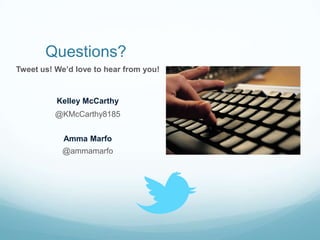The document discusses the experiences and challenges faced by graduate students transitioning into professional roles in higher education, highlighting issues such as mental health support, budgeting, and work-life balance. It emphasizes the importance of networking, peer support, and adapting to new environments while managing expectations for their future positions. Additionally, it includes insights on lessons learned and expectations from professional development, as well as the pressing challenges that institutions may face in the coming year.
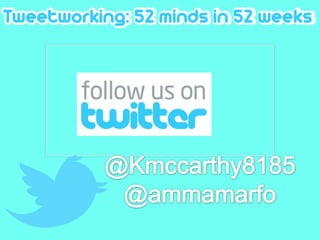
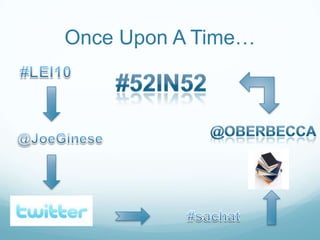
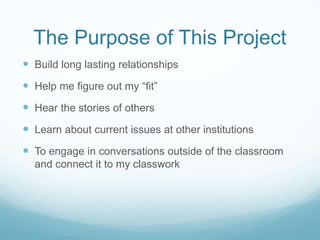
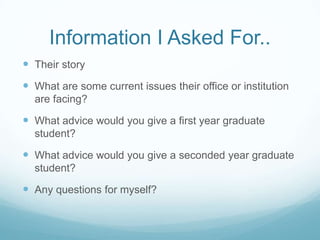
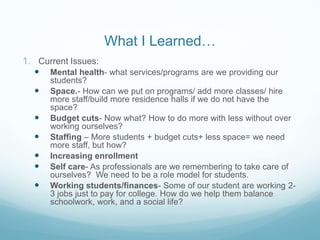
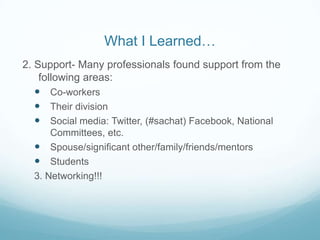
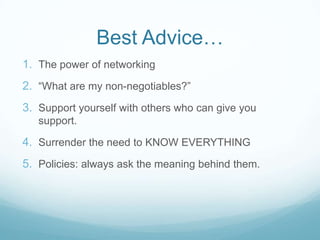
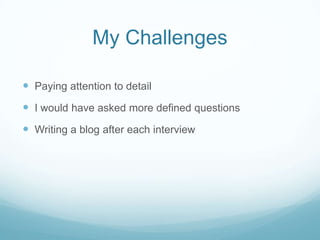
![[Demographics of Grads]
How many?
What states/institutions?
Those with assistantships vs. those without](https://image.slidesharecdn.com/tweetworkingpresentation-130206144336-phpapp02/85/Tweetworking-52-Minds-in-52-Weeks-9-320.jpg)
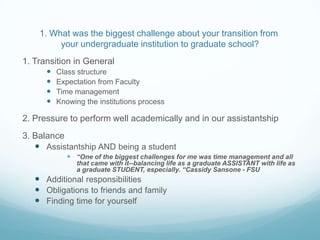
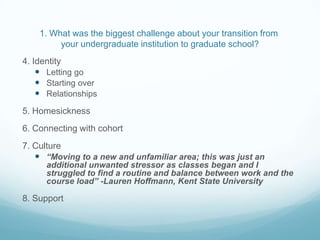
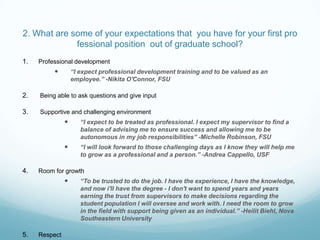
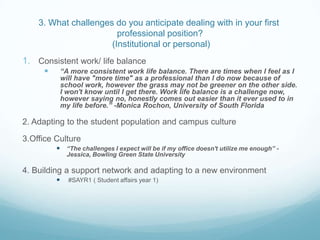
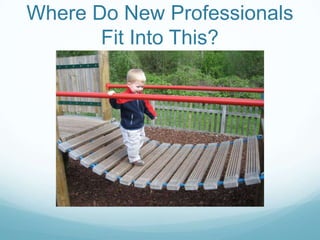
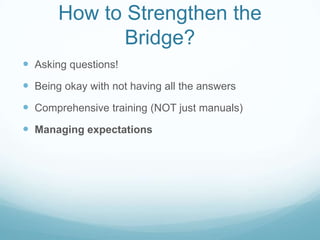
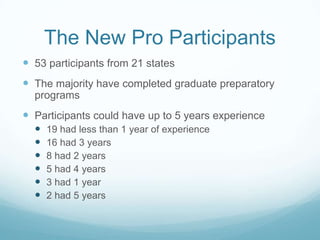
![1. What surprised you the most about your transition in to
a new professional?
What do you wish you’d known?
Change in perception
“I was most surprised by the immediate change in the way
students interact with me […] they saw me as professional
staff and did not interact with me as positively/openly when
I was a student.”
“Suddenly my opinion was wanted and my voice was
heard by those who were in much higher positions.” –
Amanda, USF
Level of preparedness
“My program and assistantship truly did prepare me to
tackle whatever came my way.”
“I wish I had known- and realized- that it really is okay to
make mistakes. You need to learn as much as your
students do!” –Megan, UGA](https://image.slidesharecdn.com/tweetworkingpresentation-130206144336-phpapp02/85/Tweetworking-52-Minds-in-52-Weeks-17-320.jpg)
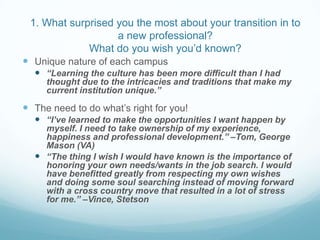
![2. What is the most important lesson you’ve learned?
“The most important thing has been knowing when to shut up and when to
speak up. As an entry level professional you want to bring what you know and
your skills […] show everyone how excellent you are at your job, and then they’ll
listen to your ideas.” –Stephanie, Texas State
“You must begin to immediately form an idea of who you are. This does not
mean that you shouldn’t continue to grow and change, but until you know your
priorities, your ethics and your strengths, it’s very difficult to function and get
work done.”
“The lesson I have learned the most through my experience is building solid
relationships with your co-workers. Feeling as though you have friends to talk to
at work is crucial during the first few months of a new position.”- Kris, USF
“[…]Regardless of how hard I try, there is ALWAYS going to be bureaucratic red
tape. Picking my battles is the only way I will stay sane. Sometimes I will pick the
wrong ones, but sometimes I can make a difference when I have a more calm
positive attitude.” –Megan, HCC Plant City](https://image.slidesharecdn.com/tweetworkingpresentation-130206144336-phpapp02/85/Tweetworking-52-Minds-in-52-Weeks-19-320.jpg)
![2. What is the most important lesson you’ve learned?
“You have to take time to ask questions and get to know your job and those around you. Be
confident in what you know and humble about what you don’t.” -Whitney, Augustana College
(SD)
“Start out having an open relationship with your supervisor and peers. It makes it so much
easier when you find you need help or when you mess up! –Sarah, Emory University
“[…]To trust my instincts- after grad school you are more prepared than you believe. This
doesn’t mean don’t ask questions but that professional judgment is often reliable.- Woody,
North Carolina State
“I’ve learned to be nice to everyone. Anyone from the janitor to people you pass in the hall to
the officers in public safety. You never know how a simple smile can make their day, or how
they may be able to assist you in the future. –Loren, Wentworth Institute of Technology (MA)
“I have learned that the AA (or the Serenity) prayer really sums up everything about the most
important lesson in a new position.”](https://image.slidesharecdn.com/tweetworkingpresentation-130206144336-phpapp02/85/Tweetworking-52-Minds-in-52-Weeks-20-320.jpg)
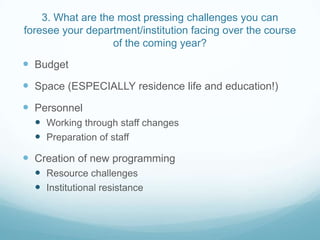
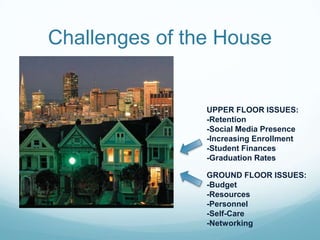
![Easing Transition Woes
Consistent work/ life balance
“It is important to make you a priority. I had the notion that
since this was my first professional position I needed to
overcommit […] this is simply not true. I need to make
sure that my personal needs are taken care of first in
order for me to be an effective professional.” –Rose,
Carleton (MN)
Adapting to the student population and campus culture
“Learn to observe. I am attempting to absorb as much as I can
in my position and in any experience I participate in while at
my new institution […] I have gained a tremendous amount of
knowledge just from listening to my supervisors speaking
with students than I could have if I attempted to dive in and
handle certain situations on my own.”-Hiram, Agnes Scott
(GA)](https://image.slidesharecdn.com/tweetworkingpresentation-130206144336-phpapp02/85/Tweetworking-52-Minds-in-52-Weeks-23-320.jpg)
![Easing Transition Woes
Office Culture
“The most important lesson I have learned is by far the
understanding of campus politics. You will NOT agree with
everything the institution is doing. But […] it is only ethical to follow
those policies and hold up the institutional goals. Understand that
not everything will be possible due to campus politics and focus your
time on what you do have control over.” –Ryan, Wentworth Institute
of Technology (MA)
Building a support network and adapting to a new
environment
“Because student affairs tends to be so inclusive and warm, it is easy
to assume that people will drop everything to welcome us when we
step onto a new campus. While this is the experience for some, it will
not be for everyone. Before you accept a position, ask really good
questions about support from your new campus and surrounding
community. What is there to do in town? What kind of support is your
supervisor/staff willing to give?” –Mallory, UNC Pembroke](https://image.slidesharecdn.com/tweetworkingpresentation-130206144336-phpapp02/85/Tweetworking-52-Minds-in-52-Weeks-24-320.jpg)
